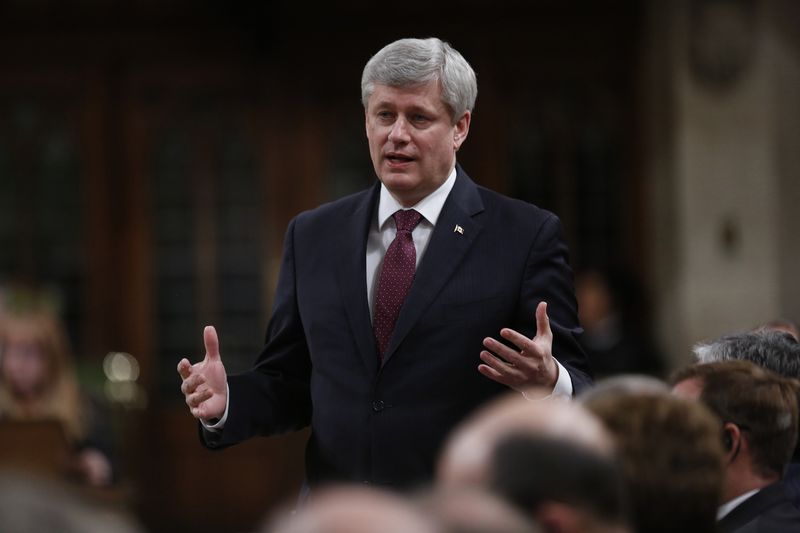By Andrea Hopkins
TORONTO, Sept 11 (Reuters) - Canadian Prime Minister Stephen
Harper, stung by criticism over his government's slow response
to the Syrian refugee crisis, shifted the focus of his
re-election campaign to national security on Friday, a move
analysts said brings the politics of fear to a deadlocked race.
Seeking a rare fourth term in office, Harper's pivot just a
month before the election positions his Conservative campaign
squarely on national security and uncertain risks.
"On Oct. 19, you will have to choose between experience and
the unknown, between security and risk," Harper told a crowd of
supporters in Quebec. "Security and experience, that's what
Conservative candidates offer."
Harper shuffled his campaign staff this week and began
repeating the message that his nine-year-old government is best
placed to protect Canadians from global threats.
"When Canadians stand together against ISIS, we stand in
support of Canadian values and in defense of our way of life,"
Harper tweeted on Friday.
Harper's use of the new tactic comes amid news of the hiring
of Australian political strategist Lynton Crosby, who helped
British PM David Cameron snatch improbable victory in May, to
reshape the party's message and help him claw back flagging poll
support. ID:nL1N11H01D
A social media campaign has criticized tactics employed by
Crosby, who has been accused of playing to racist instincts of
Australians and Britons to help conservatives win elections
there.
Political analysts said that in Canada and elsewhere
anti-immigration messages are a strong motivator among
right-leaning voters.
"It's one of those topics where he has to keep the base in
line, so he has to keep talking about jihad and the terrorist
threat," said Scott Staring, a professor at Georgian College.
"He's had a terrible campaign so far, but he is trying to
switch into a different mode right now. The hiring of the
Australian campaign manager is part of that."
Earlier this month, Harper was criticized for lacking
compassion after media reported that the migrant family of a
Syrian toddler - whose body washed up on Turkish beach and
focused global attention on the crisis - was trying to come to
Canada, turning the campaign into a referendum over how many
refugees Canada should accept.
The centre-left opposition Liberals and New Democrats have
railed against Canada's slow refugee process and pledged to do
more to accept additional refugees from the war in Syria. Harper
has spoken instead about the importance of the military campaign
against ISIS and the need to protect Canadians from the threat
of terrorism.
Pollster Frank Graves said on Friday that Harper's response
to the refugee issue has shored up the Conservative base and
played to Harper's strengths among voters worried about
unchecked immigration.
"He has gotten some of the lapsed Conservative voters,
ambivalent Conservatives, back into the fold," said Graves,
whose latest EKOS poll showed only 12 percent of Conservative
voters believe Canada should increase its intake of refugees.
Graves and Staring said it's the same populist approach that
has worked in countries such as Australia, Britain and the
United States, and Graves said his polling shows it is now
working in Harper's favor - particularly among older, uneducated
men.
"In the advanced Western world we're seeing a rise in
xenophobia, brought on in some part by a stagnant economy, and
we're definitely seeing this sort of pattern expressing itself
in the fear-based populism and resistance to immigration ...
this is not unique to Canada," Graves said.
Among Conservative voters, Harper has found support.
"Do we have housing for them? Are they going to assimilate?"
Ontario insurance agent Marg Ens, 57, said of the refugees.
"I kind of agree with the Prime Minister. We don't know who
they are. They have no papers. How do we do background checks on
these people?" the Collingwood, Ontario, voter told Reuters.
The shift to code-word politics has not been lost on
Harper's opponents, including New Democrat Member of Parliament
and foreign policy critic Paul Dewar.
"They've framed the refugee issue as a security issue, with
a dollop of fear in with that, that if we take these people in,
this could be dangerous," Dewar told Reuters on Friday. "And
it's of course a red herring."
Liberal candidate Rob Oliphant, whose Toronto riding is
among the most ethnically diverse in the country, said the
Conservative appeal to fear will drive ethnic voters who are
otherwise morally and fiscally conservative back to the Liberal
fold.
"There is absolutely no doubt that when Mr Harper is talking
about citizenship, and attempting to get his base behind him, he
is losing votes in those vulnerable newcomer communities that
are worried," said Oliphant, who lost his seat in 2011 to a
Conservative challenger.
Political scientist Staring said Harper's shift has risks,
and he'll have to walk a fine line to hold his base without
alienating moderates.
"He can't grow his support beyond his base unless he nabs
some centre-right voters, and he's not going to get those voters
by going too strong with the fear mongering. I think he has to
be careful right now."
(With additional reporting by David Ljunggren in Collingwood
and Randall Palmer in Ottawa; Editing by Ken Wills)
